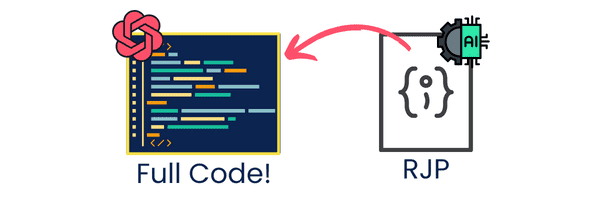This will be our first post in my new series, “Programming with AI,” where I will share tips and techniques that will help you code in no time!
⚠️ Disclaimer: This post is for educational purposes only. Please use the information responsibly—more details will follow in the post.

So, 2 weeks ago, While I was researching new AI techniques and tools to help in programming and save time coding my new apps and tools, I discovered the “RJP” technique.
This technique saved me over 60 hours of coding and allowed me to finish my New SEO Analyzer Tool backend code in minutes.
What is the RJP Technique?
Let me share a story. Last year, I created a website named “seoanalyzer.me” I didn’t build it from scratch; I bought it from codecanyon.
The site worked well, but after some time, I faced problems. Changing things on the site or adding new features wasn’t easy. That got me thinking: why not make my tool that does exactly what I want?
So, I started creating this tool. But it wasn’t easy!
I spent many days (almost two months) trying to code it. And even then, it wasn’t perfect. I got busy with other work, and soon, I couldn’t spend much time on this project. So, I put it on hold.
But then, something amazing happened. ChatGPT launched. And my prompt engineering journey started. After doing a lot of research, I learned a cool method called the RJP Technique.
What’s that? It stands for Reverse Json Prompt.
Here’s how it works in simple terms: You show ChatGPT the output of a function (in a JSON format). In our case, it is the output of the SEO Audit tool. Then, you ask ChatGPT to help you write the full code to output that JSON.
Like Magic, I just searched on Rapid API for an SEO Audit API, got the JSON, copied it, and passed it to ChatGPT as Input to a prompt.
And I got the unexpected result: the full function in seconds!
Thanks to this, our new SEO tool is now ready! And You can test the API I created here: SEO Analyzer API.
Here is the simple prompt I used:
👤 I want to build an SEO audit tool with Python, I will give you the JSON output I want, and I want you to reverse engineer and write the function that takes a URL as an input and generates that JSON as output, ready?
And ChatGPT responded:
🤖 Certainly, I can help you build a function for an SEO audit tool in Python. Please provide the JSON output structure you're aiming for so I can reverse engineer it and write the function accordingly.
I gave it the JSON, and it simply wrote the full code for me!
Thanks to ChatGPT and the RJP Technique, our new SEO tool is now ready! But having the basic function wasn’t enough for me. I want a tool with more features, like information about the target domain, backlinks, and AI analysis using AI.
You can see this in action in this video:
Ethical Considerations
When I discovered this technique, I was very surprised by how well it worked. If you try it, you might be surprised too!
But there’s a big question: Is it right to use this way? Is it ethical?
Those who follow my work know I care a lot about doing things right in business.
So, is this method okay? I’ll tell you my thoughts, but I’m also here to listen to your different opinions. Since ChatGPT became popular, many things in online business changed. This led to many questions:
- Is it okay to use ChatGPT to copy a writing style for your blog?
- Some can write posts very fast with it, while others take a long time. Is that fair?
- Is it okay to make whole books with it and sell them using other people’s ideas?
- Was making ChatGPT in the first place, training it on all the books and online info, even okay?
These are all debatable questions, and There’s much to discuss here. But let me share my thoughts in these few words.
First, I always share things based on what I’ve tried and learned. I’m just telling you about this new way because I tried it.
Second, this method isn’t perfect. It won’t work for everything, especially when you have APIs that are based on data, third-party services, or even complex algorithms and logic. But it can help you get a good start and save time.
Third, and more importantly, is to uncover AI’s capabilities to help you prepare for the future.
So, If we can save 60 hours of work in minutes, as I did in my scenario, anyone may raise the question: Is AI going to take over programmers?
Let’s talk more about this in the next part.
Is AI going to take over programmers?
Previously, I highlighted the importance of understanding the power of AI and preparing for the future it shapes.
If AI has the prowess to fully script and code APIs, does this mean programmers on platforms like RapidAPI could become obsolete and replaced by AI in mere moments?
Looking through a conventional lens, you might say “Yes.”
However, with an evolved mindset and skill set, the answer shifts to “No.”
The key lies in enhancing your capabilities, particularly in programming and prompt engineering. Focus on crafting APIs and scripts that rely on data or contain customized functionalities that hinge on unique logic and algorithms.
I’ve shown several examples and ideas in my course, [Build and Sell APIs].
Anyway, the idea is to think about implementing your own experience, data, style, logic, and algorithms not only in your code but even if you are a blogger; what makes you unique today is sharing your own experience.
And this post is a great example of this! I am sharing the results of my research with you and discussing my thoughts. This is what AI will never do (at least for now 😅).
Subscribe to my weekly newsletter to stay in the loop with my latest insights and research. I promise it’s full of value and no filler.
And if you like to discuss anything related to this post, prompt engineering, or other topics, I’d be thrilled to welcome you to our forum for a lively discussion.



Great article!
I must be looking at this differently. If a person can read a book and then write up their own summary, then an LLM doing the same thing just much faster should not be any different. Many, if not all authors copy elements of style from other authors.
In history, almost every idea, style, tone etc has been “stolen.” Imagine if there was a patent on Iambic pentameter or the structure of a haiku. Cliff Notes created an entire industry from summarizing books. It seems to be less about imitation and more about compensation.
Q: Is it okay to use ChatGPT to copy a writing style for your blog?
A: Yes. There is an almost endless list of examples of this happening outside of LLMs.
Q: Some can write posts very fast with it, while others take a long time. Is that fair?
A: It is tool. There is no need for fairness. Everyone can learn the basics.
Q: Is it okay to make whole books with it and sell them using other people’s ideas?
A: Seems like this is a normal thing in literature already. Again, LLMs are just faster.
Q: Was making ChatGPT in the first place, training it on all the books and online info,
even okay?
A: Absolutely! If it is freely accessible then it’s fair game.
ChatGPT is a tool and should be regarded as such. It democratizes the internet’s knowledge.
I’m all for more of this type of innovation.
Thanks Michael for sharing your thoughts. I think I agree with many things you mentioned, but still there are some debatable topics when it comes to ethics, AI, and future. let’s see what will happen 🙂
I am learning a lot from the prompt engineering course. I think Using chat bots and other AI tools can provide a frame work for those who are experienced with coding and prompting. You can build your own version of an app or repurpose content in an ethical way. I agree with Hasan, everything is still new and there is still a lot of gray area. It will be interesting to see how things evolve with AI.
Thanks for sharing your thoughts. I am happy you are enjoying the course
I have gone through your website and some tools like promoterKit for youtube specially – I found it really interesting the way you provided all these help material, platform to create own AI tools, The glimpse of Prompt engineering – The short book (would say) where you explained most of the things with prompt examples are way awesome, really enjoyed and most importantly, learnt alot.
Looking forward for more interesting techniques & stuffs for the society.
You are seriously doing the great job.
Thank you! I appreciate your support:)
Very interesting content about json prompts, you are really making waves in this industry where everyone else is looking to cash in this opportunity by bombarding others with AI generated invaluable content that they haven’t even tried doing themselves. While you’re teaching us based on your experience and what you have already done, I really like this thing in your content. Keep posting, and really excited about the forum thing, it would be very helpful for students like me.
Thank you, Dan, I appreciate your feedback.
😊 Thank you, my brother Hassan, you are the best. Honestly, I enjoy watching your videos. 👍
Thanks 🙂
I went over your website and several products, particularly PromoterKit for YouTube – I found it extremely intriguing how you gave all of this support material, platform to construct own AI tools, and so on. Prompt engineering – a glance The short book (I’d say) where you covered most of the subjects with timely examples is fantastic; I thoroughly loved it and, most importantly, I learned a lot.
Pingback: Build and Sell APIs [AI-Powered Blueprint]